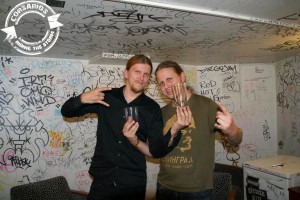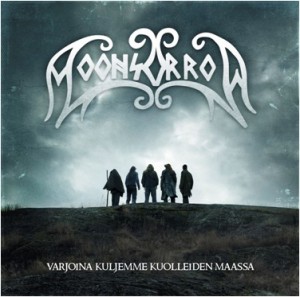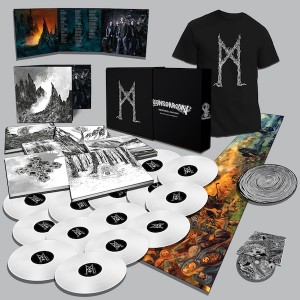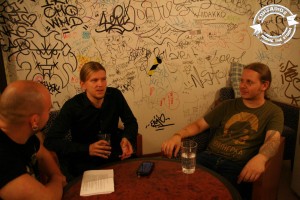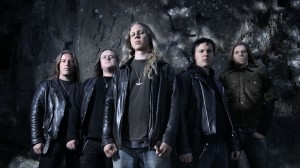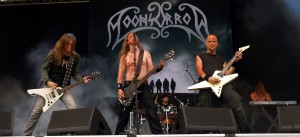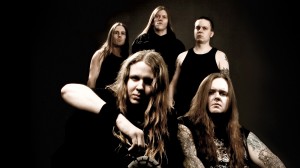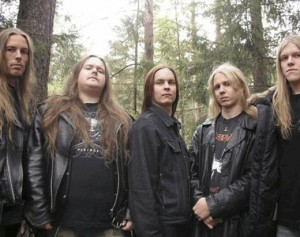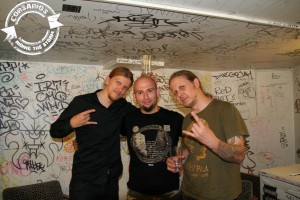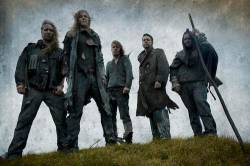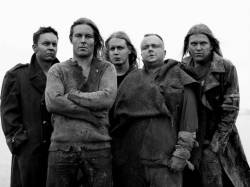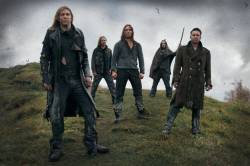Source: Henri's blog
This text was published at www.metalsucks.net as a part of their "Idol Listening"- section. As it was only concerning the albums found from the upcoming Moonsorrow vinyl box set, the last chapter- concerning Varjoina...- album and the future, was left out. So, for those who are interested, here is the whole story in it´s whole bori...uhm, epicness. If you´ve already read it, skip to the last part straight away, as the rest of the text is completely identical with the already- published version.
THE INFLUENCES OF MOONSORROW THROUGHOUT THE YEARS
a.k.a “how we managed to steal everything and never got caught”
Written by Henri Sorvali 2014
“Andi Fara/ Prologr”
This story begins in a boring suburbs of Helsinki, Finland, in summer 1995 at my parent´s garage.
When we weren´t tape- trading together like hell and hanging at the record stores with my cousin Ville, we spent our time doing project- esque rehearsal demos with my four- tracker at that garage. And among others, there was something called Monhzur.
1995- 1998 : The early years.
Our feeble, partly Finnish- sung attempt to rip off Burzum (sic!) recorded half of a demo, which we found not good enough to even finish (especially because of the cheap drum machine we used at the time) and left us quite a load of ideas and riffs for future use. After the halted demo recordings, we still wanted to do black metal, so it evolved into something we called as "Sorrowwoods". I remember us being quite influenced by Carpathian Forest, Bethlehem, Emperor and Celtic Frost at the time and blended it all together badly, resulting in "Thorns of Ice", which was recorded in different takes during the year 1996. Shortly after making the demo covers, we thought Sorrowwoods was a rather bad name for a band and thought we could use "Moonsorrow" instead, (being a song from Monhzur, actually) and thus the name you nowadays recognize better was used instead.
In early 1997, being heavily inspired at the time by Enslaved´s debut and the last Behemoth demo, we started creating a proper demo instead of using different takes and recordings, resulting into "Metsä". Originally called "Thrymgjöll" but changed in the last minute, we were proud of the result and this time we actually thought this could be worthy to release to other people as well. I guess it´s also safe to confess now that as we didn´t have any "medieval battle"- samples available for our intro nor we had the possibility to record them straight from Conan The Barbarian like they did, we actually took them straight out from Demoniac´s "Prepare for War"- album. Recycling at it´s best!
When I finally got a real sequencer and recording facilities in 1998, we thought only the sky would be the limit. Tämä Ikuinen Talvi was something that had to be done in order to realize that it wasn´t the musical direction we wanted to go after all...but the visual, almost theatrical audio was definitely there to stay, though! Both Enslaved´s “Eld” (obviously) and Emperor´s “Anthems” were a huge influence to us, especially the latter with all the synthwork, and there are traces of Immortal, old Dimmu Borgir and tons of Obtained Enslavement (especially in the last song) scattered everywhere. The demo earned us our first record deal, but before it was even released to the public, we had already dwelled into more slower, heavier- and most of all- folkier sounds, which would be known more as of our style in the following 15 years.
1999- 2003: Slowing down a bit.
Less than two months after the release of the last demo, we were already rehearsing our first full- lenght album with Marko- the strongest influence being Bathory´s “Blood on Ice”, which had completely blown our minds earlier. Combined with a dose of Hades´ “Dawn of the Dying Sun”, Borknagar´s debut, Thyrfing´s “Valdr Galga” and Einherjer´s “Odin Owns Ye All”, we felt we had found our spiritual and musical home. One can still find traces of Enslaved and Ulver scattered every here and there, but the "Finland´s answer to Bathory" was probably the most used term for our debut album.
We continued the path onwards and Marko participated on composing for the first time with us on the next album, “Voimasta Ja Kunniasta”. The creation of the new material already begun a couple of months after the recordings of our debut album, and while we were still influenced by the abovementioned albums -Bathory being even stronger influence than ever- this time we brought even more folk music to the package. I was listening a lot of Scandinavian folk at the time (Garmarna, Annbjørg Lien, Hedningarna and Nordman (!!!) being my favourites), and picked a ton of influences from there, while Marko also brought in some ideas from 70´s proggressive rock for the first time. We also listened a lot of punk and vikingarock while drinking together, and brought some ideas from there too- especially in the song "Kylän Päässä".
The natural evolvement of our sound and tendency for dramatic pompousness led to creating the massive opus "Kivenkantaja", which was the first album we had the artistic courage to blend in any kind of elements we had previously thought not to fit our music. Like Marko, I also have a history with progressive rock, so we listened a lot of old prog vinyls (Rick Wakeman´s “King Arthur” being the most influential record for us at the time due to the historical themes it sported as well) and experimented with all sorts of instruments we could think of. We felt we combined every single musical influence we had ever had in our lives, resulting in a rather interesting blend of metal, folk and progressive music. Jumalten Kaupunki was very much inspired by Bal- Sagoth, and Kivenkantaja bows heavily to Windir, who we all loved. The sampled vocals in the beginning of Tuulen Tytär were taken from a Mari Boine- album, and even though I don´t like Pink Floyd, I had to borrow some influence from them to the ending of Raunioilla with the guitars. (And as you probably know, that sure wasn´t the only one “being inspired by” - part done with that song, hah!)
But when everything is done, topped, creamed and overproduced...how are you supposed to do it even better? With Kivenkantaja, we felt we had painted ourselves into a corner and there would be no way to make another, even more epic and over - the- top Kivenkantaja #2.
So we decided to BLOW THE FUCK OUT THAT CORNER instead.
2004- 2008: Speeding up again.
When me and Ville gathered for the first time to think what would we want to do with the next album, we both agreed to wave goodbye to the overproduced epicness and concentrate more on moss, woods and more "traditional" production. The first song which was completed was “Jotunheim”, and it had a completely different, Kivenkantaja- sounding music in the middle of it at the time. After having started with “Karhunkynsi” and turning it into the enslavedesque it became, I quickly went back to Jotunheim to realize it needs more of that "traditional approach" as well, which was the turning point for the whole sound to become. Soon we were basically inhaling our records shelves like crazy, being heavily inspired by pre- 2000´s era Satyricon, Enslaved, Burzum ...and many other less pompous Norwegian bands who were a big influence for us in the beginning. When the recordings were finished, we were sure no- one would like the album but us. To this day, still I consider Verisäkeet having the best atmosphere from any of our records thus far.
Picking up from where Jotunheim was left, we continued working with Hävitetty in spring 2006. As a band of eternal opposites and controversy, it was pretty natural move to make a way slower album after a rather fast one. During the time we composed and recorded the album I was also having the worst period of my personal life ever, which reflected quite much on the musical side and production as well. I was listening to tons of Cold Meat Industry bands (In Slaughter Natives and Puissance in particular), but held Drudkh, Esoteric and the debut albums from Katatonia and In The Woods extremely inspiring at the time. For what it comes to the biggest influences, though, I can safely say that without “Forgotten Legends”, “Hvis Lyset Tar Oss” and “Disintegration” (The Cure) we would had probably sounded way different. My purpose musically was to create a web of music where tones and timbres tangle into each other, forming into a tightening and suffocating grip resembling of drowning, depicting how I felt at the time. I still cannot listen to Hävitetty due to the memories it brings me from the time it was recorded, and consider the album being the most personal I have ever done in my life.
In 1992, there was Conquest of Paradise. Twelve years later, there was Arns Rike. And as I couldn´t wait my turn to rip Vangelis off at 2018, we did Tulimyrsky already in 2008 to break the tradition. The composing of the song started with Marko´s main riff (4:50 onwards) and ended up being probably something Jethro Tull or Yes could had sounded like if they played Enslaved- inspired black metal. The song was probably our most technical entity thus far, it´s structure and arrangements resembling more of a progressive rock song from the 70´s or classical music rather than straightforward Bathory- rip- off. While we had implemented quite much sound effects to our music earlier, Tulimyrsky also took that to completely into another dimension and featured even acting and foley sounds behind the music. (The tradition which kept continuing in “Varjoina”- album later). We were doing the album at our friend´s studio with no strict schedules, so we had time to test ideas, drink beer and have fun as well instead of extremely organized working we were used to do under pressure. While we make extremely visual, dramatic and pompous music on purpose with absolutely no irony on it, we often tend to hide some musical "tributes" here and there for our own amusement. And as usual, all sorts of them were also present this time. Vocal delays done purposedly out of time in the true Norwegian tradition, some parts sounding so much like old Amorphis that we actually asked our friend Tomi Koivusaari to grunt on top of them, and in one riff the vocal arrangement was mimicking Ulver´s "Soelen Gaaer Bag Aase Ned" as closely as possible. The best thing for myself, however, was to actually have a chance to finally hide a Wilhelm scream to the part where the ships were attacking, haha!
2009 onwards: The heavier combination of everything above.
Dust settling and firestorms slowly extinguishing in early 2010, I wasn´t totally satisfied with Tulimyrsky as a composer. I felt it had way too many parts and sometimes stumbled into it´s own technicality. As a personal statement, I wanted to open the next album with something slow, crushing and celticfrosty, resulting into the first minutes of "Tähdetön". We were completely sick of post- black metal (spit!) bands popping out of everywhere and wanted to make a clear distinction on them as well, and thought it had the perfect start for the album. And as the whole concept and tracklist was written before the composing started (!), we ended up creating all the songs in the order they were intended to be, in where the first chords of Tähdetön served us as a great starting point from where to continue onwards. We took inspiration from other stuff as usuall- from the metal side I listened a lot of albums like Thyrfing´s “Hels Vite”, Melechesh´s “Emissaries" and Raate´s “Sielu, Linna” to name a few, and you can spot traces from Gentle Giant, Paul Simon (!!) among other weird influences. And believe it or not- 1800´s traditional Scandinavian funeral music (played with pedal harmonium and other folk instruments, which I unfortunately couldn´t find from Youtube, so this was the closest reference I could dig up and has nothing to do with folk music in particular) was a huge source of inspiration throughout the process, which can be mostly heard in especially in “Kuolleiden Maa”. Perhaps the most influential record during the arrangement- process, however, was the stunning debut album of Triptykon, which inspired us to take heavy (pun intended) advantage on guitar department- adding quite a lot of feedbacking and very bottom string- structured playing to our music besides our usual string arrangements. Which, I believe, will also play a huge part in our upcoming album we are working with as we speak.
“Epilog/ Slaget”
As a music fan first and then a musician, I have never found any shame on giving credit to the artists who have inspired me in my own art. Without the abovementioned artists, albums and songs Moonsorrow wouldn´t probably existed in the first place and I´d like to express my sincere gratitude towards all the people behind my inspiration and influences. Hopefully this wall of text has shed a bit light on the creation of Moonsorrow´s sound throughout the years, and I thank you for actually reading this far. We´re currently in the process of composing our new album, which is scheduled to be recorded at end of 2014 if everything goes as planned. Expect to hear traces of everything listed here with a ton of new elements and other nasty tricks up our sleeve.
Hails,
Henri Urponpoika Sorvali, Moonsorrow.

